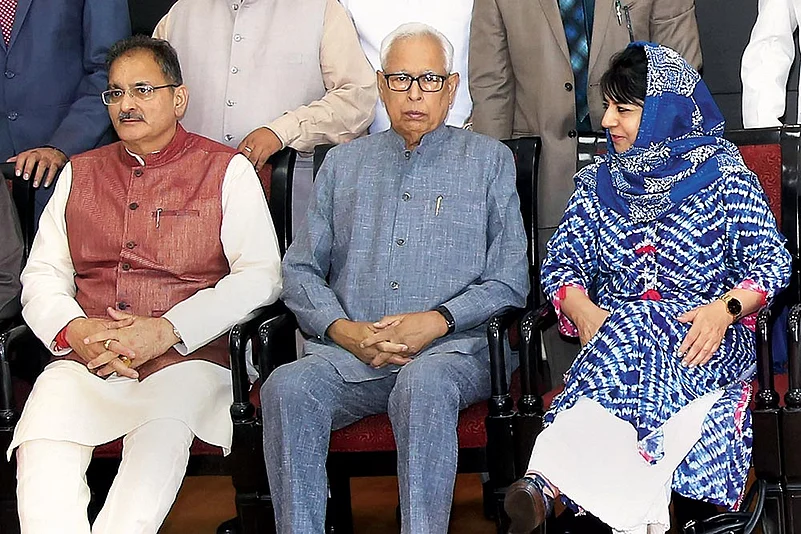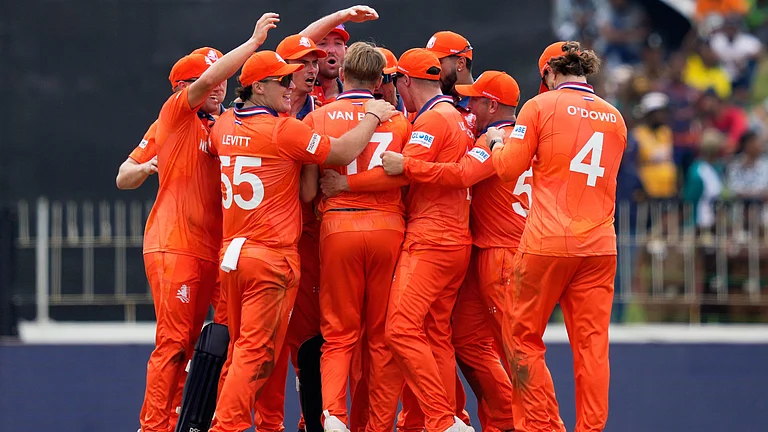On April 13, the day the BJP asked two cabinet ministers in J&K’s coalition government—Chaudhary Lal Singh and Chander Prakash Ganga—to resign for attending a rally of the Hindu Ekta Manch (HEM), the party had, in fact, asked all its ministers to resign. Lal Singh and Ganga’s resignation letters were swiftly sent to Chief Minister Mehbooba Mufti and they were dropped the next day from the Council of Ministers. The CM had raised the issue of their attending the March 1 rally of the HEM with the prime minister. The rally had been organised to demand the release of those accused of an eight-year-old Bakarwal girl’s rape and murder in Kathua this January.
The resignation letters of the other BJP ministers, however, remained with the party’s state president, leading many political pundits in Delhi to speculate that the BJP might part ways from the Mehbooba-led government. It took the cabinet reshuffle of April 30 to put that idea to rest. Now, it seems quite certain that alliance partners BJP and PDP are in it for the long haul, despite their political and ideological differences.
The BJP has replaced deputy CM Nirmal Singh with Kavinder Gupta, who was the Speaker of the assembly. Refraining from echoing the position of most BJP leaders in the state, who have been asking for the Kathua case to be handed over to the CBI, Singh had toed the PDP line, saying the case is sub-judice and it’s for the court to decide. A history professor at the University of Jammu, he had started his political career with the student organisation, the ABVP, and served as a BJP general secretary before being elected from Basholi assembly constituency of Jammu division in 2014, and was appointed the deputy CM in March 2015.
In 2006, Singh participated in a three-day conference on ‘Prospects for self-governance in J&K, and present status of cooperation and communications across the LoC’, organised by American think-tank Pugwash in Pakistan’s capital Islamabad, and met the then Pakistan president General Pervez Musharraf.
Singh’s replacement Gupta was an RSS worker and also associated with the ABVP for three years in Punjab, where his father was a government employee. He joined the BJP in 1988 and was appointed district president of the party’s youth wing, the Bharatiya Janata Yuva Morcha (BJYM). In the 2014 assembly polls, he contested from the Gandhi Nagar constituency in Jammu city, considered a stronghold of Congress leader Raman Bhalla, and won, while the ‘Modi wave’ got the BJP 25 of the 37 seats in the province, making it the second largest party in J&K after the PDP.
On March 18, 2015, Gupta was nominated the Speaker of the assembly, and while in that role, is said to have often claimed to be a “proud RSS worker” and complained about not getting a higher priority in the protocol list than deputy CM Singh—for INStance, when Singh’s cavalcade would overtake his convoy.
Gupta’s innings as deputy CM, too, started on a controversial note when, soon after taking oath on April 30, he described the Kathua rape and murder as a minor incident that “shouldn’t be given much importance”. After this led to outrage, he clarified, “The Supreme Court has not given a verdict…. There is no point in discussing it over and over again. There are a lot of similar cases and this particular one should not be exaggerated.”
The BJP MLA from Kathua, Rajiv Jasrotia, has also been elevated as a minister of forest, environment and ecology, the post vacated by Lal Singh, leading former CM Omar Abdullah to question the decision as Jasrotia, too, had attended the HEM rally that the PDP described as “pro-rapist”. “Two BJP ministers removed in J&K for attending a pro-rapist rally and an MLA who is reported to have attended the same rally is promoted as a minister. Why are the BJP/Mehbooba Mufti confused about where they stand on the Kathua rape?” Omar asked in a tweet.
National Conference (NC) spokesperson Junaid Azim Mattu says, “The Kathua MLA who attended the HEM rally has been given the forest ministry, which has been hounding the Gujjar-Bakarwal community that was also targeted in the Kathua case.” By inducting Jasrotia, the BJP is trying to test the PDP’s patience, but it may boomerang as Lal Singh could also ask why he was told to resign, says a senior official requesting anonymity.
Kishtwar MLA Sunil Kumar Sharma has been made the power minister—a powerful post considering the number of hydroelectric projects coming up in J&K. Sharma, incidentally, in one of the accused named in an FIR registered at the Kishtwar police for allegedly being part of a mob that attacked Muslims during communal clashes in 2008.
The PDP, on its part, used the opportunity provided by the BJP reshuffle to elevate Mohammed Ashraf Mir, who had trounced Omar in Sonwar constituency in 2014 and “celebrated” it by letting loose a volley of bullets into the air from the AK-47 assault rifle of his personal security officer. “The PDP chap let off an AK-47 to celebrate his victory over me,” Omar had said then. “Thank goodness I didn’t lose Beerwah! I wonder what they would have fired!”

The others inducted into the Council of Ministers from the BJP are state president Sat Paul Sharma, Shakti Parihar and Devinder Kumar Manyal. As the PDP had removed Haseeb Drabu, MLA from Rajpora in south Kashmir’s Pulwama district, from the post of finance minister last month for his alleged remarks that Kashmir should be seen as a “social issue”, not a political one, the party has given the agriculture portfolio to Mohammed Khalil Band, who represents Pulwama constituency, to keep its south Kashmir voters intact.
The PDP has also replaced law, justice and parliamentary affairs minister Haq Khan with the more “proactive and assertive” Syed Basharat Ahmad Bukhari. Chowdhary Zulfikar Ali, Imran Raza Ansari and Abdul Rehman Veeri have been allotted the education, higher education and rural development portfolios, respectively. Party spokesperson and public works minister Naeem Akhtar has been given additional charge of the ministry of culture.
In the state BJP, the workers were seeking a ministerial reshuffle as there was a widespread perception in Jammu that the ministers had been unable to deliver. It seems their inability to deliver on the governance front also became one of the reasons leading to the large-scale reshuffle by the BJP. Party spokesperson Arun Gupta, however, says, “We had six years to govern. For three years, we gave 11 MLAs the chance to gain experience in governance. All elected members need to understand how to run the government. So, now after three years, the chance to learn governance has been given to another group.”
While Gupta confidently talks about the coalition surviving its full term—i.e., another three years—NC’s Mattu says, “It is hard to speculate how long this government will survive as they survive on a week-to-week basis. This government is clueless.”
Analysts here fear the BJP might use the volatile situation in Jammu and Kashmir to polarise voters in the rest of the country ahead of 2019 general elections. If controversial statements keep emanating from the new ministerial faces, that would keep the pot boiling. Anticipating, perhaps, that Modi would be back as PM after the 2019 general elections, the PDP sees the best course in continuing to be the part of the government, while urging the Centre to go in for J&K-centric confidence-building measures (CBMs) in the years ahead. Akhtar has been urging the Centre to appreciate the importance of mainstream parties in Kashmir and respect the accords with them. “In our case, it is an Agenda of Alliance, while in case of the NC, it is the autonomy resolution. If they are unable to reach any understanding with us, how can they reach an understanding with the separatists?” asks Akhtar, who wants the Centre to do more.
By Naseer Ganai in Srinagar


























